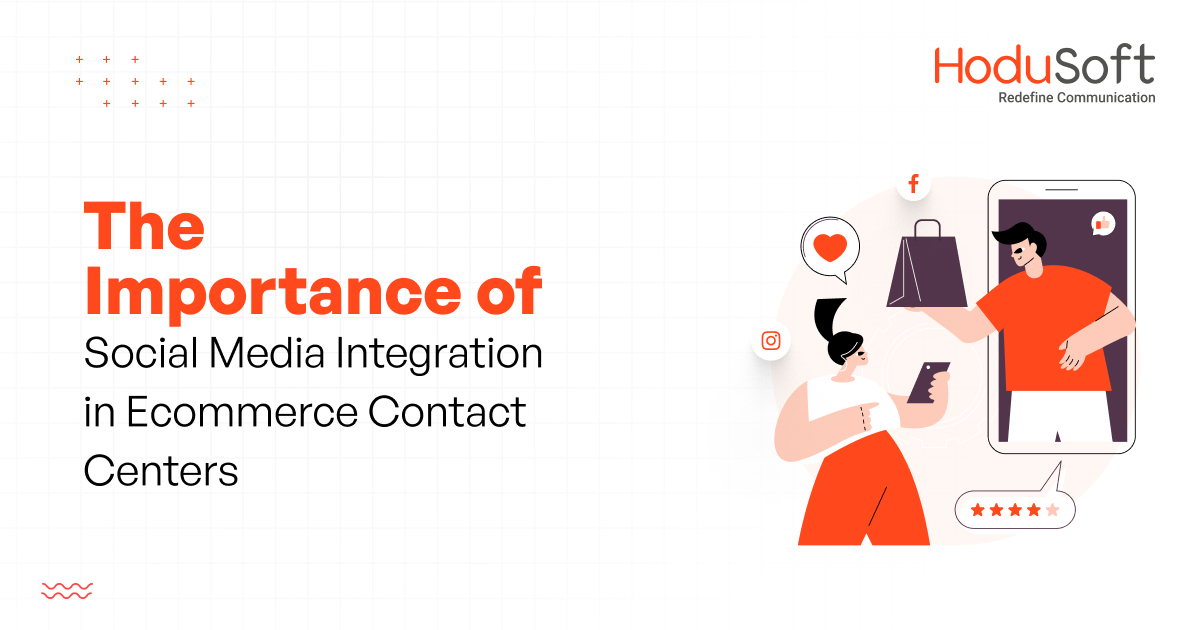The Importance of Social Media Integration in Ecommerce Contact Centers
Before we start with the blog, let’s do a quick experiment. If you are already logged into your social media account, click on the search bar, and type the name of one or multiple e-commerce companies you can think of. How many can you find?
Chances are high that you will find almost all of those on social media. Social media presence is indispensable for e-commerce companies, and rightly so. After all, that’s the next best thing to their well-crafted websites.
Come to think of it; social media platforms not only enable online retailers to showcase their products and offerings in high-resolution images but also engage with customers and prospects, communicate with them on a one-to-one basis, and gather valuable data and key insights on customer behaviour.
Social media is so beneficial for e-commerce companies, especially the relatively newer and smaller ones, that a new term has emerged—social commerce.
As noted venture capitalist Bing Gordon rightly said, “The potential for social commerce today is infinite. Every ecommerce site will have to adapt.” By leveraging social media platforms, online retailers can reach a larger audience in an extremely cost effective manner.
Not just that, they can overcome many of their challenges in a highly efficient way. As Vladimer Botsvadze, an award-winning thought leader and influencer, said, “Social media opens the floodgates to business owners to maximize their success.”
At HoduSoft, we have helped some reputed and rapidly-growing e-commerce companies in leveling up their social media game. We have engineered our HoduCC omnichannel contact center software with social media integration to enable e-commerce companies efficiently manage customer communication on their preferred social network.
In this blog post, we will discuss the key challenges e-commerce companies overcome with social media integration, what social networks should e-commerce companies consider to enjoy strong social media presence, as well as the best practices for effective social media integration.
What Challenges Can E-commerce Companies Overcome with Social Media Integration?
“Can social media integration indeed help e-commerce companies overcome some of their challenges?” This question may come to your mind after reading the above subheading. Let’s take a look at what are the challenges social media integration can help online retailers overcome:
1. Improve Customer Retention Rate
According to recently published data, the average customer retention rate in the e-commerce sector is about 38 percent. When compared with other sectors, the customer retention rate of the e-commerce industry is among the lowest.
Social media integration can help e-commerce companies increase customer satisfaction and retention by leaps and bounds by fostering direct, real-time engagement with customers. When online retailers integrate social media with their contact center solutions, they can create personalized experiences, offer exclusive promotions, and showcase new products and offerings to customers.
2. Bring Down Cart Abandonments
As per a study conducted by Baymard Institute, the average cart abandonment rate in the e-commerce sector is 70.19 percent. The visitors who leave just before they are about to make the purchase do so due to many reasons such as lack of proper customer support, lack of clear communication, problems with the website, billing and payment issues, checkout complexities, and others.
Social media integration can be immensely helpful in reaching out to such visitors and induce them to complete the purchase. By leveraging social media integration, e-commerce companies can put retargeting ads on social media platforms, which would remind visitors about their abandoned carts. Social media integration has helped many online retailers in bringing back visitors who abandoned their carts.
3. Succour from Cutthroat Competition
The competition in the e-commerce sector is intense and cutthroat! The global e-commerce market, which is projected by Precedence Research report to surpass USD 75 trillion by 2034, attracts hundreds of new entrants every year. But a joint study conducted by Forbes, Huffington Post, and Marketing Signals, found that nine out of every ten newly-launched e-commerce businesses fail within the first four months of their launch.
So, there’s no doubt that the e-commerce sector is extremely competitive. How can social media integration help? Well, integration of social media platforms with communication systems can help e-commerce companies adapt to customer preferences and trends. That will enable e-commerce companies to boost brand loyalty and stay ahead of competition.
4. Targeted Campaigns to Offset Limited Marketing Budget
Many e-commerce companies, unlike their larger and more established counterparts, cannot afford to invest huge amounts of money on advertising and marketing campaigns. Apart from not having the budget to carry out traditional advertising and marketing campaigns, many such e-commerce firms also lack the connection to popular public figures to give their brands the much required push.
In such a scenario, social media integration can immensely help e-commerce companies to have a strong social media presence. By leveraging social media analytics, targeted advertising, and influencer partnerships, e-commerce companies can reach specific audiences and create more personalized experiences.
5. To Build Trust
Barring a few world famous names, a majority of new and smaller e-commerce firms struggle to build trust. It’s relatively easy for traditional brands that mostly sell their products in retail outlets and brick-and-mortar stores to do that. That’s because they offer the touch-look-and-feel factor. Visitors to their shops can hold the products as well as try those out on the spot. However, online stores offer no such experience. A study found that over a third of Gen Zs feel that most e-commerce sites are not trustworthy.
Social media integration can help e-commerce companies boost brand awareness, enhance customer satisfaction, and build trust. By integrating social media platforms with their communication systems, e-commerce companies can showcase positive user-generated content and reviews. They can engage in community-building activities that can strengthen brand loyalty.
What Social Media Platforms Should E-commerce Companies Integrate?
When it comes to integrating social media platforms with communication systems, e-commerce companies are spoilt for choice. However, amid a wide range of options out there, e-commerce firms must consider their target audience, marketing goals, and product offerings. Here are some most important social media platforms online retailers should consider:
1. Facebook
With 3.07 billion monthly active users, Facebook is the leading as well as the most used social platform. Founded in 2004, it’s relatively older than other social media platforms and is best for targeting older demographics.
As an e-commerce company, you must consider integrating your Facebook account with your communication system to reach a wider user base. Apart from the massive user base, Facebook offers a wide array of tools for e-commerce companies, such as Facebook Shops, targeted ads, and Messenger for customer service.
2. Twitter
If you believe in creating a lasting impact using fewer words and content, then Twitter (or X, as it’s presently known) is just for you. It still is one of the biggest social media platforms and it’s a sheer delight for those e-commerce companies that know the power of witty and laconic copywriting. It has enabled all types of customers, especially online shoppers, to follow brands and reach out to them whenever they need instant resolution to their issues.
Twitter also allows for real-time engagement, customer service, brand interaction, announcements, and brand awareness. Even though it’s not directly built for e-commerce, it can be used to share promotions and drive traffic to online stores. Integration of Twitter accounts is critical for e-commerce companies as almost three-quarters of customers who reach out to brands on Twitter expect a response within an hour.
3. Instagram
This social network is owned by Facebook and is one of the most popular platforms in the world. Boasting of a user base of over a billion monthly active users, it’s a highly visual platform and it enables people to share picturesque image and short video content.
It also enables e-commerce businesses to showcase high resolution images, videos, and stories of their products and offerings. When it comes to direct messaging, it’s also extremely useful. It’s features such as Instagram Shopping allow users to buy products directly from posts. It’s best for fashion, beauty, home decor, and lifestyle brands.
4. WhatsApp for Business
WhatsApp for Business is a powerful tool for personalized communication, order confirmations, and customer service through direct messaging. It’s beneficial for both smaller e-commerce businesses as well as larger online sellers. It’s highly effective for personalized customer service and building customer relationships.
By integrating WhatsApp for Business with their communication systems, e-commerce companies can send and receive notifications for queries, update order status, get customer feedback via one-to-one chat, and many more.
5. Snapchat
Snapchat is the fastest growing social media platform with an average of 414 million daily active users all over the globe. A majority of the users are aged 13-34, which makes the social network an excellent platform for e-commerce companies to reach younger audiences with fun and creative campaigns.
Snapchat is increasingly popular for e-commerce. With augmented reality (AR) features, Snapchat allows for creative product displays and sponsored lenses for immersive shopping experiences. It’s best for fashion, beauty, and tech products aimed at Gen Z. Snapchat users are more likely to make impulse purchases and are influenced by friends and family recommendations.
6. LinkedIn
LinkedIn is the second fastest growing social media platform with more than one billion members in over 200 countries and territories worldwide. The professional network platform is extremely useful for B2B e-commerce.
As per recent data, nearly 50.3 percent of marketers in the United States use LinkedIn as part of their marketing strategies. It’s growing at a rapid pace, especially among B2B companies. Apart from B2B commerce, the platform is useful for lead generation, networking, and establishing authority in niche markets.
7. Pinterest
Launched in 2010, Pinterest is the third fastest-growing platform right now, behind Snapchat and LinkedIn. It has about 500 million monthly active users around the world and a majority of them are affluent. As per a recently published data, Pinterest directs nearly 33 percent more traffic to e-commerce websites than other social media channels. It’s the third fastest-growing platform right now, behind Snapchat and LinkedIn.
Pinterest allows for advanced targeting based on demographics, interests, keywords, and more. E-commerce companies, such as Cailini Coastal, which registered a year-over-year revenue growth of 1,163 percent by strategically leveraging the social network, can do the same for driving traffic to their sites.
Best Practices for Successful Social Media Integration
To integrate social media channels with your communication system in the most effective way, you need to follow some best practices. Here are some best practices:
1. Determine Your Target Audience
“Understand your target audience.” Whether it’s selling something or crafting messages for a group of people, you have to know certain things about them. It can be their demographics, interests, online behavior, and preferred platforms. This is the first step of social media integration and it will help you boost customer engagement, foster brand loyalty, and drive higher customer satisfaction.
2. Analyze Some Successful Companies in the Sector
Visit the website of some successful e-commerce companies and analyze how well they have integrated social media channels as well as engineered their integration strategies. By taking the time to study how industry leaders and successful companies in the e-commerce sector have leveraged social media integration, you can take a leaf from their books.
3. Select the Right Platforms
Not all social networks offer the same benefits or reach the same type of audience. Out of many, you will have to choose platforms that align with your target demographics and are relevant to your audience. Focus on the platforms where your target audience is most active. Whether it’s Instagram for visual storytelling, LinkedIn for professional engagement, or Twitter for customer service interactions, selecting the right social media channels can significantly enhance your customer engagement and increase your brand recognition.
4. Invest in the Right Tech Solution
Last but not the least, you need to handpick the right tech stack to help you integrate social media platforms with your communication systems. It’s best if you can select a solution that has built-in social media integration, which can enable you to reach out, engage, monitor, and support your customers on their preferred social networks.
Taking Everything Into Consideration,
For e-commerce companies, 24/7 customer support has become non-negotiable. There is no way an online retailer can choose not to provide 24/7 customer support and expect to stay afloat for long.
That’s why integrating social media platforms with communication systems is the basic thing that e-commerce companies need to do.
In such a scenario, adopting sophisticated contact center software such as HoduCC can be a game-changer.
By integrating a wide array of social media platforms such as WhatsApp, Instagram, Facebook, and Twitter, HoduCC enables businesses to connect with customers wherever they are.
If you own an e-commerce business and want to know more about HoduCC’s social media integration, contact our team of experts to book a free demo.



